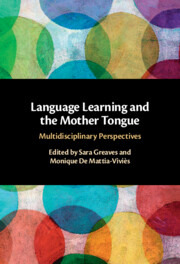Book contents
- Language Learning and the Mother Tongue
- Language Learning and the Mother Tongue
- Copyright page
- Epigraph
- Contents
- List of Contributors and Their Works
- Acknowledgements
- Introduction
- Part I The Mother Tongue and Second Language Learning
- Part II From the Mother Tongue to the Second Mother Tongue
- Part III The Second Mother Tongue as a (M)other Tongue and the Return to the Body
- 7 The Sea of Language
- 8 Samuel Beckett’s Change of Literary Language
- 9 Language, the Brain, and Relating
- Subject Index
- Author Index
- References
8 - Samuel Beckett’s Change of Literary Language
An Apparent Severing of Links to Continue Writing on the Maternal Side of Language
from Part III - The Second Mother Tongue as a (M)other Tongue and the Return to the Body
Published online by Cambridge University Press: 16 June 2022
- Language Learning and the Mother Tongue
- Language Learning and the Mother Tongue
- Copyright page
- Epigraph
- Contents
- List of Contributors and Their Works
- Acknowledgements
- Introduction
- Part I The Mother Tongue and Second Language Learning
- Part II From the Mother Tongue to the Second Mother Tongue
- Part III The Second Mother Tongue as a (M)other Tongue and the Return to the Body
- 7 The Sea of Language
- 8 Samuel Beckett’s Change of Literary Language
- 9 Language, the Brain, and Relating
- Subject Index
- Author Index
- References
Summary
In this chapter, the author, as a psychiatrist who has written books on Louis-Ferdinand Céline and Samuel Beckett, both writers who push back the limits of literary writing, focuses on Beckett's change of literary language, not from the starting point of exophonic writing and self-translation, as most critics writing on Beckett’s bilingualism usually do, but ‘from underneath’, making this change of literary language appear as an apparent severing of links to continue writing on the ‘maternal side of language’. The author brings his specialist knowledge of adolescent care to bear on his subject and explodes some of the myths surrounding Beckett’s change of language, such as the famous ‘no style’ of French and the idea of a ‘counter-language’ to ward off the ‘(s)Mother tongue’. The author presents Beckett’s use of French as a paradoxically regressive move, which allows him to live ‘in exile within exile’, to set up the conditions of ‘nostalgia’ by putting the distance of the foreign language to the service of a risky regression to infancy in search of the body, in search of sensory perception and archaic aggressivity: a language ‘beyond the verb’.
Keywords
- Type
- Chapter
- Information
- Language Learning and the Mother TongueMultidisciplinary Perspectives, pp. 137 - 170Publisher: Cambridge University PressPrint publication year: 2022

